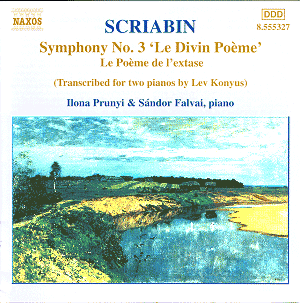Alexander
SCRIABIN
(1872-1915)
Symphony no. 3"The Divine Poem" Op 43
"Poem of Ecstasy" Op 54
(Transcribed for two pianos by Lev
Konyus)
 Ilona Prunyi
and Sandor Falvai,
Pianos
Ilona Prunyi
and Sandor Falvai,
Pianos
 Naxos
8.555327
[56:12]
Naxos
8.555327
[56:12]
Crotchet

Scriabin was a superb pianist by all accounts. Indeed, when he graduated
as a pianist from the Moscow Conservatory with a second prize in 1892, the
first prize winner was none other than Serge Rachmaninov. However, in spite
of his undoubted keyboard skills I believe that these works were magnificently
conceived specifically for the extravagant orchestral forces which the composer
employed. Scriabin had a phenomenal ear for orchestral texture and colour
and it is notable that his own attempt to prepare a two piano version of
The Poem of Ecstasy ended in failure, hence the intervention of the
brother of his former teacher, Georgy Konyus. Lev Konyus had already prepared
a two piano version of The Divine Poem some years earlier which at
one time was believed lost.
The intention was that the two piano scores would be of help to conductors
when preparing performances of the works and in this respect they can be
viewed as purely practical exercises. Indeed, when one considers what must
have been seen as the complexity and eccentricity of this music, the benefit
to the conductor of being able to get inside the music through these scores
can be understood.
In reality they do stand up as works in their own right although I suspect
that they will only be of passing interest to anyone other than Scriabin
devotees or those undertaking a serious study of the works.
The performances are somewhat disappointing in that they simply fail to come
to life. I found myself wanting for a greater degree of passion and, ultimately,
abandon in the playing. In this respect the Poem of Ecstasy fares
rather better than The Divine Poem, but overall these are "safe"
performances which take few risks. When one considers the clear sexual programme
of the Poem of Ecstasy I found that the earth just did not move for
me.
The recording is a little lacklustre and not as well engineered as certain
other Naxos releases which I have listened to of late. I would add that although
there is a useful booklet note by Keith Anderson the pianists themselves
are given no introduction and will therefore remain as mysterious to the
listener as the elusive masterpieces which they perform.
Overall then this disc does have some curiosity value and is possibly worth
a listen for those who are familiar with these works. For those who are not
my advice is to listen to them in all their orchestral glory
first.
Reviewer
Christopher Thomas
Performance

Sound


